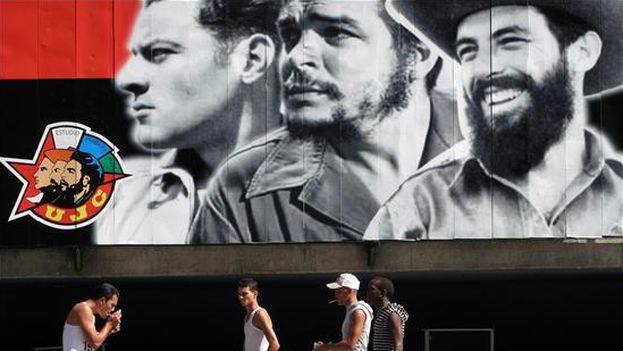
14ymedio, Reinaldo Escobar, Havana, 8 July 2015 – The extensive preparation for the Tenth Congress of the Union of Young Communists (UJC), to be held in Havana from 17 to 19 July, displays the same old contradictions that hinder this type of event. It is a formula that is repeated, be it a conclave of peasants, artists, women or journalists: it is one thing what the membership from within the organization desires and another what is imposed on each institution from outside by the Party-State.
If this “great event of Cuban youth” meets its stated intention that the organization be increasingly relevant to the young people it represents, it would make a radical U-turn, from changing the name of the institution to renewing its statutes and governing documents. If, on the other hand, it follows the guidelines and “illustrious directions” emanating from the highest authority, it will only modify those details that grind the gears favoring obedience.
There is a sincere desire among many members to eliminate all the bureaucratic mechanisms that make the UJC an inert entity, whose only reason for being is to issue quotes and keep good archives of the copies of the minutes that are sent to the municipal leadership from each Committee of the Base.
Filling out the models, elevating questions that never receive an answer, attending as a guest the boards of directors meetings at schools and workplaces, exhorting the mass of young people to study more and to act as informers on others who commit illegalities, have been frustrating roles performed by many of the organization’s cadres, or at least that is the stereotypical image held by many youth who are not active in the UJC.
They give the impression that it would be enough to simply change the language to be better understood by young people, whose codes of communication are notoriously alien to the jargon filled with slogans and triumphalist rhetoric. What the official discourse considers politically correct usually seems tacky and boring to those under 20; instead, whatever is presented as transgressive, or at least novel, immediately captures their attention.
When a UJC leader collaborates with the principal of a high school to get the students to wear the uniform properly and cut their hair in the correct style, it sounds terrible to those who have to hear it; and makes no difference if it’s delivered in the style of a catechism or a rap. They aren’t going to listen.
If the interests of the new generations were really proportionately represented, the discussions would become a battlefield
One of the themes of the Tenth Congress is cultural consumption and recreational options. If the interests of the new generations (whether valid or not) were really proportionately represented, the discussions would become a battlefield. On the one hand, we have the government’s concern that cultural patterns, opinion matrices, globalized lifestyles seen through new technologies, can contaminate young Cubans; on the other hand, we have the insatiable appetite for modernity of those who insist on behaving like the people of the 21st century.
None of the other planned themes, except the inner workings of the UJC, provoke intense debate among the event’s attendees. Neither the process of updating the Cuban economic model, nor the new scenarios of defense of the Revolution, nor even the participation of student organizations in educational transformations, present opportunities to become an interesting story.
There is always hope that one of the members of the delegation from Magarabomba, in the province of Camaguey, will break the routine and — like the always helpful boy in the story — will turn to all those present and announce that the king is naked. Even so, the television cameras would be focused on another scene and the accredited journalists would not even take note of the fact in their agendas.
In summarizing the event, Machado Ventura will say that this was a historic congress and the delegates will stand and applaud and shout in unison any new motto. By the way, I nearly forgot a detail that illustrates the complete absence of commitment to change: Fidel Castro is one of the 39 delegates to the Tenth Congress from the province of Santiago de Cuba.
